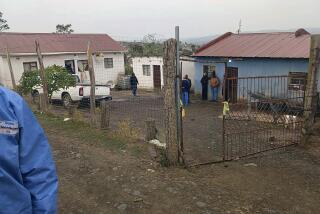3 Black Policemen Among 6 Held in S. Africa Massacre
- Share via
JOHANNESBURG, South Africa — Three black South African policemen were among six people arrested in the mysterious weekend massacre of 13 members of a moderate black political group, police headquarters in Pretoria said Monday.
The victims, all members of Zulu Chief Mangosuthu Gatsha Buthelezi’s 1.2-million-member Inkatha movement, were killed in an attack on the house where they were staying in KwaShange, a black township outside Pietermaritzburg, about 300 miles southeast of Johannesburg in Natal province. Seven other people were seriously injured.
It was the worst incident of political violence here in many months, and it followed an upsurge in the bitter feuding between Inkatha and the rival United Democratic Front in Natal. More than 30 have been killed in the past month--and it was the third such massacre in Natal this year.
Inkatha accuses the UDF of rejecting alternative political views and of attempting to force blacks into supporting the outlawed African National Congress in its struggle against South Africa’s white-led minority government. Blacks say that making the wrong choice in siding with one or the other of the two groups places their lives and those of their families in danger.
But the alleged role of three black police officers, far more likely to be Inkatha than United Democratic Front supporters, was puzzling, and police headquarters said it could provide no further information and could not identify the three other men arrested in connection with the incident.
John Mabaso, an Inkatha organizer in Pietermaritzburg, blamed the United Democratic Front for the killings, and Buthelezi, expressing his “grief and revulsion” at the deaths, called for an end to the feuding between the groups.
The victims, aged 14 to 22, were all members of Inkatha’s youth brigade, Mabaso said, and were protecting the house of a senior Inkatha member against an expected attack by members of a United Democratic Front affiliate.
The attack came early Saturday morning, Mabaso said, when members of a rival group armed with spears, clubs and guns surrounded the house, set it on fire and killed or wounded those inside when they tried to escape, either shooting them or hacking them to death with machetes.
“The killings must stop,” said Buthelezi, who is chief minister of the KwaZulu tribal homeland. “Black-on-black violence does nothing but create a vicious circle of death and despair. The struggle for black unity and liberation is being set back time and again. . . .
“Blacks must show each other that we have not been so dehumanized by the (apartheid) system that all that is left is to turn on each other like a pack of rabid dogs. What future have we if our dignity and our decency is destroyed in ongoing orgies of hate and revenge?”
Leaders of the United Democratic Front and Inkatha have met several times over the last six months in an attempt to end the groups’ feuding, and Inkatha recently appealed to the African National Congress to use its influence to halt the clashes.
Thirteen United Democratic Front supporters and members of their families were shot and killed at Amanzimtoti, south of Durban, on Jan. 21, and seven youths, members of one of the front’s affiliates, were found dead--stabbed to death and their bodies dumped in a ditch--in KwaMashu, northwest of Durban, on March 17.
The United Democratic Front blamed Inkatha for both incidents.
Another Inkatha official from Pietermaritzburg said Monday that much of the recent violence had been hidden by the South African police to give the impression that the state of emergency has restored calm to the country. The incident at KwaShange, for example, was originally reported by police as tribal fighting between rival Zulu clans.
“The police are not telling the people everything,” the official, Vitus Mvelase, said. “A lot more is happening then is appearing in the (official) unrest reports. . . . The township residents, Inkatha, the United Democratic Front--we are all sick of the violence, and the people are getting angry.”
A police spokesman in Pretoria replied that all incidents are reported when there has been a death, an injury or an arrest but that clashes between groups are generally described as “faction fighting” to avoid giving them “unnecessary publicity.”
More to Read
Sign up for Essential California
The most important California stories and recommendations in your inbox every morning.
You may occasionally receive promotional content from the Los Angeles Times.












